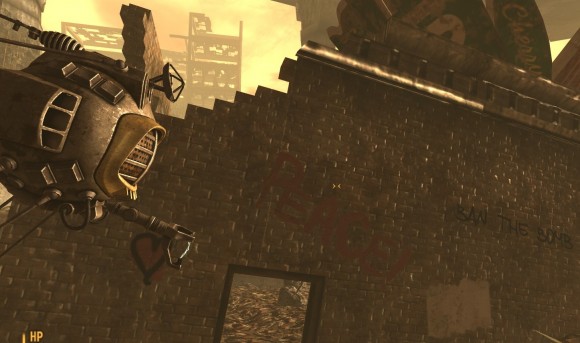
After writing about Honest Hearts a little while ago I felt I should say a little about the three DLC packs which followed it up: Dead Money, Old World Blues, and Lonesome Road. This isn’t so much a review or an essay or anything more cohesive than some thoughts I wanted to share and/or explore a little. Think of it as me indulging in enthusiasm, that most prevalent of currency in the mercantile exchange of games journalism. It is part of my portfolio for an application to write for GameSpot. Or, you know, whatever. I like Fallout. Maybe you’ll find this interesting too.
Dead Money I may have the least to say about. It’s a fun piece of DLC that strips you of all equipment and throws you into an extremely hostile environment with a lot of mysteries set up around it. It’s at its best when exploring the Villa, evading or killing gasmask-toting self-resurrecting freaks and trying not to stray into patches of corrosive fog that can kill you in seconds. The sense of mystery and the unknown is at its strongest here, and the few other living characters you meet are staggered out, allowing you to fully absorb their personal stories – should you choose to.
Once you break into the casino itself they are pulled away from you, and each of their stories is only returned to in order to lay on a suitable peak for each thematic arc. The story of the casino itself, and that of the architect of your involvement with it, turns out to be a fairly traditional Fallout story of forgotten old-world tech being sought after by morally repugnant collectors of old-world tech. The palpable atmosphere of the Villa vanishes once inside the casino itself, with its security holograms lacking the menace of the Ghosts – somehow, knowing that something cannot be killed converts it from an intimidating foe into a pattern you just have to learn to avoid.
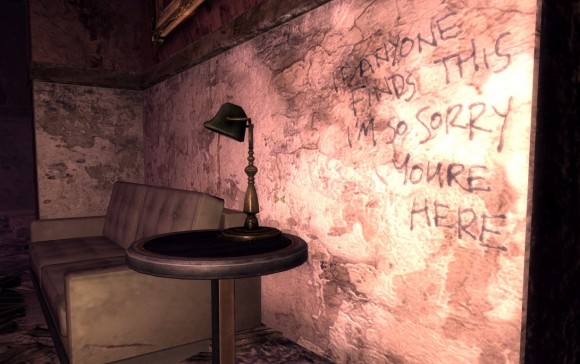
Dead Money does leave you with assorted mysteries, however, and these are ably answered in Old World Blues, a legitimately brilliant take on the Fallout mythos and easily the funniest and most referential entry in the series yet. Its comedy is subtler than Fallout 2 and packed with more amusing lines and characters to boot (no, I’m not saying it’s better than FO2, but it’s got its strengths…). At its best when darkly comic, Old World Blues also manages to pack in subtle moments of genuine horror, iconic imagery, black satire of the American dream and mountains of delicious lore. It delivers surprises throughout, including overturning lazy videogame quest assumptions in a way that’s perfectly true to the cynical yet tongue-in-cheek world of Fallout. And I never once expected to see lines like “It looks like it’s been tag-teamed by giant fuckbots” in a Fallout game and, even better, for it to not seem at all out of place.
Did I mention the voice acting? It’s superb. They brought in a number of voice actors from The Venture Brothers, which is a damn fine decision in my view.
Old World Blues is packed with dozens of micro-stories to explore and unpick, each typically buried within an abandoned old-world science facility. It’s as though the DLC is a microcosm packed with the distilled version of the Fallout experience that a certain type of player – the backstory geek – loves. And oh boy, I loved it.
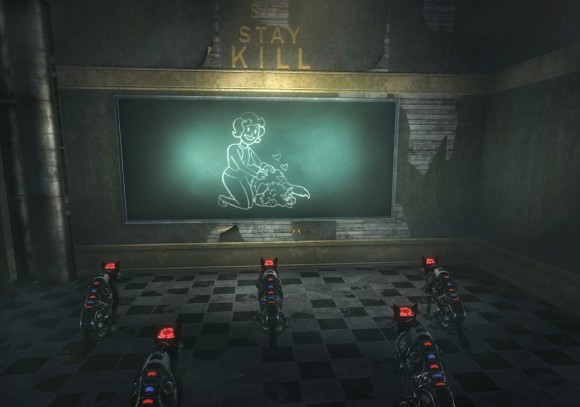
Best of all, though, Old World Blues stretches tendrils into its predecessor as well as its follow-up, answering questions from Dead Money whilst raising more for Lonesome Road.
Lonesome Road is, sadly, a far less memorable experience than Old World Blues. Its setting is perhaps the most scorched nuclear wasteland since Washington, but its palette is restricted to browns and oranges compared to the 1950s neon superscience setting of OWB. Its enemies are less varied, with the DLC mostly throwing tough variations on New Vegas humans and critters at you (with one notable exception).
It’s difficult at times, with enemies more than capable of taking you down quickly if you get too cocky, and at higher levels this difficulty makes rather a mockery of the stealth mechanic. In fairness this is a problem for New Vegas in general – after level 30, it’s almost impossible to stay hidden from high-level enemies, even at night, with maxed-out sneak and a bevy of stealth-enhancing perks. So say goodbye to those sneak criticals!
Fortunately, Lonesome Road is interesting for its thematic ideas – which is the best thing for a late-game piece of DLC to do in my view; far more interesting for dedicated players than a significant mechanical shift. Though there is some of that too: Lonesome Road deliberately strips out interaction with other characters to narrow the player’s focus on the one character who speaks to them – Ulysses, another wasteland courier. He communicates with the player via a variation on ED-E; a mute companion. Ulysses likes to lecture the player, and his lessons concern consequences. The DLC is a fairly linear experience, in contrast to what’s come before; a necessity to deliver the narrative experience that it was obviously designed to do.
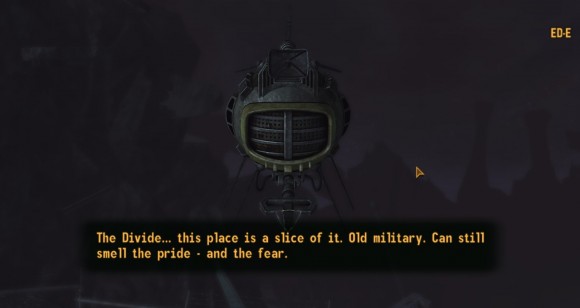
Lonesome Road is one of the more successful examples of metatextual criticism within a videogame narrative I’ve seen post-BioShock. Ulysses’ arguments are framed in terms of the harm that the Courier – the player character – has caused by his actions. This is admittedly dramatically ramped up by retconned backstory stating that the Courier caused the destruction of an entire community and the deaths of hundreds even before the original game began, but the way it is articulated makes it clear that it concerns a character who does things purely to see what happens. A character driven not, at heart, by morality, but by curiosity, and a desire for personal gain that hinges upon the acquisition of experience. The Courier imposes that curiosity upon the world, that lust for experience and sensation, thereby imposing their decisions upon the world, and in so doing causes harm – whether through ignorance or malice does not matter, as this is only a byproduct of the root cause.
It’s a cleverly woven critique of the way games like Fallout are played: ostensibly a heroic figure, the actions of the player in fact impose change upon the world that will, if followed through, involve consequences that cannot be foreseen and usually end poorly for characters other than the supposed hero – the wanderer with no home, no fixed point of origin, no community to belong to and be beholden to. The Courier, like the player of a videogame, is rootless, responsible to nothing but their own urges and desire to seek feedback to stimulus.
As the old saying goes, a hero is nothing but a guy who gets other people killed. Videogames only tend to consider that in terms of the people at the other end of the gun barrel.
The story of Lonesome Road itself must ultimately end somewhat flatly in the face of this critique, and that it does to some extent – spicing up the final moment with a difficult choice of tangential personal sacrifice versus genocide – the sort of choice that videogames can so glibly present as equal options – but as a vehicle for a powerful analysis of how player agency is seated within a fictional world it’s extremely successful.
Also, dudes’ heads still explode in slow motion when you get a critical. Fallout’s a fun game. And it’s nice to have stuff to think about while you’re exploring the wasteland.
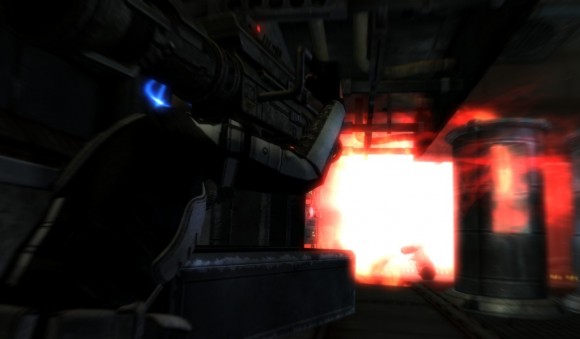
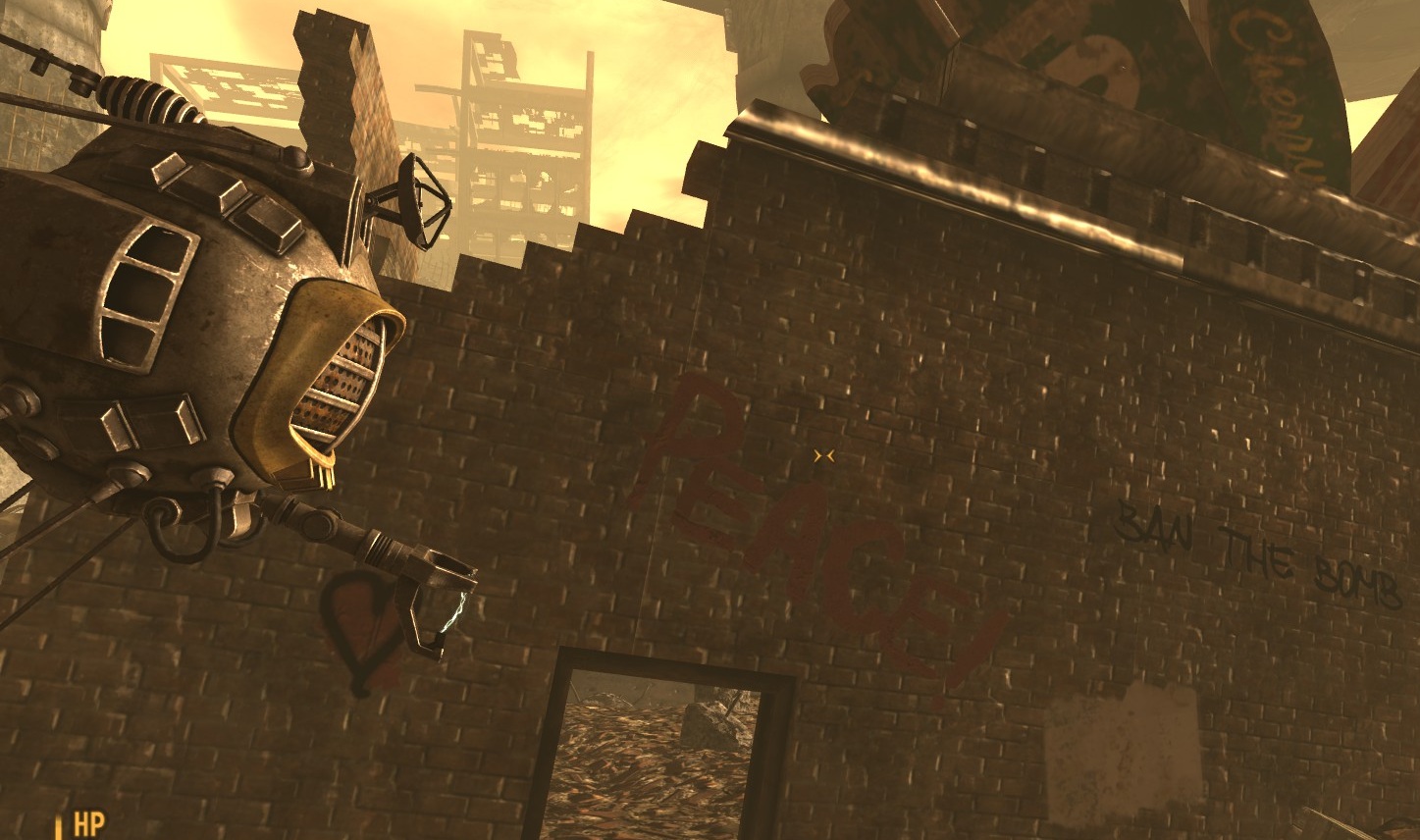
Comments
12 responses to “New Vegas: if I never hear that song again…”
"no, I’m not saying it’s better than FO2" – Good. Keep it that way.
Reading this has made me sliiiightly interested in FO:NV DLC, but I just can't shake the knowledge that I will never want to play another game in that Bethesda vein again. FO:NV was pretty much the last straw, but I despised Skyrim entirely and absolutely twice over – once for the engine, and once for everything else. Just don't think I can bring myself to enjoy any of those games now.
That's fair enough! I had thought that Skyrim had put the final nail in the coffin, for me, as per my piece earlier this year. But New Vegas tempted me back with its new stories (and the fact that I'd already bought them).
Mechanically I still find the Fallout mold a lot more entertaining than TES, and aesthetically I think it stands out a lot more (even given all the postapocalyptic copycats we see nowadays). But it's the capacity of the Fallout setting to provide great stories, and Obsidian's skill at handling those, that really drew me back in. I wish I could lend you Old World Blues just so you could give it a try.
I would play it round yours, but there is no point because I couldn't bring myself to care about it in the presence of Tokyo Jungle.
…good call.
Tokyon Jungle: the new Earth Defense Force?
Personally, I liked Dead Money the most. If you know how to get away with all the gold, it's even better. I didn't understood which was was your favorite DLC though. Lonesome Road?
James of New Fallout
Hi James, thanks for stopping by!
I'm not sure that I have a favourite, as each piece of DLC offers something different and uniquely Fallout. That said, I think I found Old World Blues tickled me the way Fallout 2 did so well, and genuinely made me laugh with some great writing and voice acting. But I absolutely loved the theme of Lonesome Road, to an extent that elevated it despite its linearity and lack of imagination in other areas.
So, I have been playing a bit of Fallout: New Vegas in an attempt to see if I will like it.
I think that the two things that have I can take away from my time with it is that it has no problem in allowing you to get meditatively bored (which is no bad thing as games should allow for that) but that it also has streamlined things that make some of the challenge a chore and then not streamlined certain things so that they also feel like a chore. Sometimes the two combine!
For example, the quick travel and over encumberance: two perenial hatreds of mine.
So you become over encumbered which is annoying but at least there is this sense of wanting to be rooted in reality and also make the player have to make difficult choices (except that crafting materials weigh almost nothing and bullets weigh almost nothing but that is a separate criticism).
Would be great except that you can quick travel from almost anywhere and sell all the excess to a vendor. In fact you can do that to any locale that you come across and so encumberance is an annoyance and fast travel is also an annoyance.
By no means a terrible game but it is just a case that I just really care about most of the systems present in the game.
Have you touched any of the DLC, or just the core game? Whilst I really like the core game I think it's the DLC that sets out to explore the most interesting ideas.
I think I'm in agreement with what you're getting at in this comment. Although encumbrance in the Bethesda Fallout games is way less of an issue than the TES games (in terms of the amount of collectable, saleable junk you find) it is still frustrating to constantly run up against weight limitations when you want to earn some serious caps.
The fast travel I'm ambivalent about. Striking out in a direction and seeing what happens along the way is great, but once you've been playing for a while the fast travel is a massive boon. I imagine I might be happier if fast travel only became available later in the game, as opposed to being there from the outset, but no doubt that would raise questions around both when and why.
No – I don't think I will either. This game has now set itself up as the reason I won't be playing any more Bethesda style games. In the same way that Assassin's Creed II was the last shout for Ubisoft open world games.
What Torchlight did with Item management and what Far Cry 2 did for quick travel is what I would have liked for the 'problems' Fallout:NV has (that or go with what Fallout 2 does).
Make Quick travel to anywhere possible but make it only from certain spots. You can become encumbered but once you have a companion you can get them to take the extra stuff and sell it – means you don't have a team mate but also doesn't break up the experience.
The other solution for quick travel would allow it from anywhere but devise a system that calculates the chances (based on the direct root you take) of you encountering a wandering enemy and then dumps you into a fight. So, in some cases it would be quicker (if the direct root is along a road) but in actual fact there might be some fast travel that would be really dangerous as it won't have your guile and instead dumps you in the middle of combat.
Justifying why/where is not really a big deal considering they don't justify why/where with the current implementation – fuck it, make it a PIP boy upgrade.
That's fair enough. I thought Skyrim had done for me what NV has done for you, but I suspect that I will try out Fallout 4. I just love the setting enough to overlook its flaws. Short of major changes, though, I'm done with the Elder Scrolls.
Torchlight's loot-flogging system was inspired. Yeah, Bethesda should definitely take a leaf out of that book. Acquiring their games' larger sums of money, required for the more interesting stuff, is definitely a bore.
I also wouldn't argue with quick travel becoming less ubiquitous. I've also contemplated encounters as you describe, though there's a risk they wouldn't mesh with all character classes (e.g. a sneaky character with weaker combat skills getting put face to face with a deathclaw would seem unfair).
There aren't any insurmountable problems with either set of proposed changes, though, and I think both would make a big difference.
[…] As someone who actually liked Bethesda’s The Elder Scrolls:Â Oblivion I was enthusiastic about Fallout 3Â and played it through twice, the second run including all DLC. When New Vegas appeared I was genuinely thrilled by it, with Obsidian’s writers and designers bringing something of the moral ambiguity and factionalism of the early games to Bethesda’s shiny new engine. Its DLC went even further, offering interesting post-colonial engagements, blackly comic satire and – trust me on this one – metatextual critique of its own gameplay and design. […]